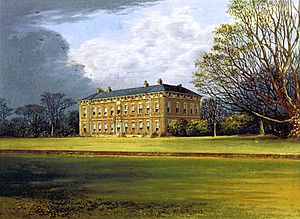John Bourchier (regicide) facts for kids
Quick facts for kids
Sir
John Bourchier
|
|
|---|---|

Beningbrough Hall, rebuilt in 1716, owned by the Bourchier family until 1827
|
|
| Council of State | |
| In office March 1652 – July 1652 |
|
| Member of Parliament for Ripon |
|
| In office March 1647 – April 1653 |
|
| Personal details | |
| Born | 1 January 1618 Beningbrough Hall |
| Died | 9 August 1660 (aged 65) London |
| Resting place | St Mary Magdalen, Milk Street |
| Nationality | English |
| Political party | Parliamentarian |
| Spouse | Anne Rolfe (1619-1649) |
| Children | Bridget (1620-1662), Barrington (1627-1695), Elizabeth |
| Alma mater | Christ's College, Cambridge |
| Occupation | Landowner and Puritan activist |
Sir John Bourchier (born around 1595 – died August 1660) was an English landowner and a strong supporter of the Puritan movement. He backed the Parliamentarian side during the Wars of the Three Kingdoms, a big conflict in England.
Sir John was one of the judges who decided the fate of King Charles I in January 1649. He voted for the King's execution. After the King's son, Charles II, returned to power in 1660, Sir John was set to face trial. However, he passed away in August 1660 before his trial could begin.
Contents
Who Was Sir John Bourchier?
John Bourchier was born in 1595. He was the oldest son of William Bourchier and Katherine Barrington. His mother and her brother, Sir Francis Barrington, raised him. Sir Francis was a very religious Puritan who was even jailed by King Charles I. This family connection greatly shaped John's own beliefs and political views.
Education and Early Career
John Bourchier likely studied at Christ's College, Cambridge. He also joined Gray's Inn, which was a place for legal training, around 1609 or 1610. He was given the title of 'Sir' (knighted) in 1619.
In 1625, Sir John became a Justice of the Peace for the three areas of Yorkshire. This role meant he helped keep law and order.
Sir John's Role in the English Civil War
King Charles I tried to raise money by forcing people to give him loans in 1627. Sir John Bourchier was one of the people who bravely refused to pay these "forced loans."
When the English Civil War began, Sir John was arrested. He was held in York until 1643. In 1647, he was chosen to be a Member of Parliament for Ripon. He was one of the few Members of Parliament allowed to keep his seat after an event called Pride's Purge.
The Trial of King Charles I
Sir John Bourchier was chosen as one of the judges for the trial of King Charles I. He was one of the people who signed the document that ordered the King's death.
After the King's son, Charles II, returned to the throne in May 1660, this period was called the Restoration. Sir John was very ill at this time. He was too unwell to stand trial for his role in the King's death. He died a few months later. Even at the end of his life, he still believed his actions were right.
Sir John's Last Stand
Even though he was very old and sick, Sir John Bourchier was allowed to stay at his daughter's house. His family hoped he would say he was sorry for his part in the King's trial. They thought this might help them.
But Sir John was very upset by their request. He suddenly stood up, something he hadn't been able to do without help for days. He felt a burst of energy as he remembered his actions. He told his family, "I tell you, it was a just act; God and all good men will own it." After saying this, he sat down again and passed away peacefully soon after.
Family Connections
Sir John Bourchier had some interesting family connections to important figures in English history.
He was a great-grandson of Margaret Pole, 8th Countess of Salisbury. She was a powerful noblewoman who was executed by King Henry VIII. Interestingly, King Charles I was a great-great-grandson of Margaret Tudor, who was King Henry VIII's sister.
Sir John was also a great-great-great-grandson of Richard Neville, 16th Earl of Warwick. This famous person was known as the "Kingmaker." He earned this nickname because he helped put both Edward IV and Henry VI on the throne during the War of the Roses, a series of wars for the English crown.
 | Dorothy Vaughan |
 | Charles Henry Turner |
 | Hildrus Poindexter |
 | Henry Cecil McBay |

